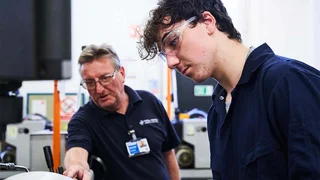Blogs, News and Case Studies

As it is National Conveyancing Week, we thought now was the ideal time to sit down with our resident expert Michelle Timms and answer some of the hottest questions about the industry, training and the future!
With nearly 20 years’ experience in the conveyancing industry, Michelle is a qualified Licensed Conveyancer and was previously a Legal Director at a busy conveyancing firm. Michelle also has taught Level 4 and Level 6 Diplomas in Conveyancing Law and Practice for 12 years and still retains some tutoring responsibilities.
In this Q&A (part one of three), we asked Michelle all about the conveyancing industry and the day-to-day role of a conveyancer.
About conveyancing
How does conveyancing work?
Conveyancing is the legal process of transferring property ownership from one party to another. A conveyancer or solicitor handles all legal aspects of the property transaction, including the preparation and review of contracts, conducting searches, handling funds, and ensuring that all legal requirements are met.
The conveyancing process begins with the initial instruction from the client to act on their behalf. Each party (the buyer and seller) will have their own conveyancer.
The seller’s conveyancer will draft the contract and supply the buyer’s conveyancer with all necessary documentation and information about the property being sold. The buyer’s conveyancer will conduct thorough research on the property, including checking the title, Land Registry details, and any relevant planning permissions or restrictions.
Once the terms are agreed, contracts are exchanged. At this point the seller and buyer are bound by the terms of the agreement and a moving date is set (also referred to as the completion date). On the completion date, the funds are transferred to the seller and the keys are released to the buyer.
Do I need a conveyancer when buying a house?
It’s not a legal requirement to hire a conveyancer when buying a house, but it is highly recommended. A licensed conveyancer can help you navigate the complex legal process involved in property transactions, ensuring that all documentation is completed correctly and that your interests are protected throughout the buying process. They will also conduct searches on the property to check for any potential issues such as planning restrictions or boundary disputes.
If you’re buying with the assistance of a mortgage, your mortgage lender will require you to have a conveyancer or solicitor acting on your behalf. The seller’s conveyancer / solicitor will also be unlikely to accept purchase money from a personal account because professional undertakings would be required, as well as due diligence to identify where the funds have come from (for anti-money laundering purposes).
The regulatory body for the firm acting for the seller would also have their own requirements, so even though it’s not a legal requirement, it is very difficult to purchase a house without a conveyancer or solicitor acting on your behalf.
Are conveyancing searches necessary?
Conveyancing searches are an essential part of the property purchasing process in the UK. These searches involve obtaining information from various sources to help identify any potential issues that affect the property. This could include checking for any planning permissions, environmental concerns, or outstanding debts associated with the property.
The purpose of conveyancing searches is to provide the buyer with crucial information that might not be readily apparent from a simple inspection of the property. By conducting these searches, buyers can make an informed decision about whether to proceed with the purchase and potentially avoid any costly surprises in the future.
How long does conveyancing take?
The duration of conveyancing varies depending on the complexity of the transaction. On average, the conveyancing process takes from 8 to 12 weeks to complete.
Several factors influence the length of time it takes for the process to be completed. These include the efficiency of your conveyancer, the responsiveness of all parties involved, the complexity of the transaction, and any legal issues that arise during the process.
About conveyancers
What do conveyancers do?
Conveyancers facilitate the legal transfer of property from one party to another and have a crucial role in the property buying and selling process, ensuring that all legal aspects are handled correctly and efficiently. This includes conducting property searches, drafting and reviewing contracts, and making sure all necessary documentation is in order.
Conveyancers also work closely with clients, estate agents, and other professionals to ensure a smooth and timely completion of the transaction.
What is the difference between an estate agent and a conveyancer?
An estate agent and a conveyancer have two very different (but essential) roles in the process of buying or selling a property.
An estate agent facilitates the sale or rental of a property on behalf of the owner. They are responsible for marketing the property, arranging viewings, negotiating offers, and generally overseeing the sales process. Estate agents are primarily focused on securing a buyer or tenant for the property and usually work on behalf of the seller.
On the other hand, a conveyancer is a specialist in property law and is responsible for handling the legal aspects of the property transfer process. A conveyancer will conduct searches, prepare contracts, handle the exchange of funds, and ensure that all legal requirements are met before the property is transferred to the new owner. They play a crucial role in ensuring that the property transaction is legally sound and completed in a timely manner.
What’s the difference between a licensed and unlicensed conveyancer?
The main difference between a licensed and unlicensed conveyancer is the level of expertise and professionalism they offer. Licensed conveyancers have specific knowledge and skills in property law and conveyancing practice, ensuring that they can provide accurate and reliable advice to their clients. They’re also bound by the Council for Licensed Conveyancers code of conduct and professional standards, which means they must act in the best interests of their clients.
On the other hand, an unlicensed conveyancer does not have the same level of regulation and might not have the necessary qualifications to provide legal advice or services in property transactions.
How much do conveyancers earn?
The average annual salary for a Licensed Conveyancer in the UK ranges from £35,000 to £45,000. However, this can vary depending on location, experience, and the size of the firm you work for. More experienced conveyancers, or those working in London, might earn significantly more than this, while those just starting out in smaller towns might earn less.
It’s important to note that the information provided is an average. Many factors influence the salary of a conveyancer, such as additional qualifications, specialisations, or the current demand for conveyancing services in the market. It’s always best to research specific salaries in your area and consult with professionals in the field for more accurate information.
Is conveyancing a stressful job?
Yes, conveyancing can be a stressful job at times but is ultimately a satisfying one. As a Licensed Conveyancer, you’re responsible for ensuring that property transactions are legally valid and completed smoothly. This involves dealing with a lot of paperwork, negotiating terms with multiple parties, and ensuring all legal requirements are met. There can be strict deadlines to adhere to, and any mistakes can have serious consequences for both you and your clients.
Factors such as the complexity of the transaction, the number of parties involved, and unforeseen issues that may arise during the process can all contribute to the stress levels experienced by conveyancers. It’s important to stay organised, communicate effectively with all parties, and seek support from colleagues or professional networks when needed.
However, while conveyancing can be a stressful job, it’s also an extremely rewarding one. You are helping clients navigate the property market and move into their dream homes.
Are conveyancers in demand?
Conveyancers are indeed in demand in the UK, especially in busy property markets where there’s a high volume of transactions taking place. As property purchases and sales require legal expertise to ensure a smooth and legally binding process, the services of conveyancers are sought after by anyone buying or selling a property.
The demand for conveyancers can also be influenced by various factors, such as fluctuations in the property market, changes in legislation, and the overall economic climate. The geographic location can also play a role in determining the demand for conveyancing services, with urban areas typically having a higher demand than rural areas.
What is a conveyancers’ role in fraud prevention?
Conveyancers play a crucial role in fraud prevention. They’re responsible for conducting thorough due diligence checks on all parties involved in the conveyancing process to verify their authenticity and legitimacy. This includes verifying the identity of the buyers and sellers, investigating any suspicious behaviour or inconsistencies in the documents provided, and being vigilant for any signs of fraudulent activity.
Additionally, they work closely with other professionals such as solicitors, mortgage lenders and government bodies to cross-reference information and ensure that all legal requirements are met. By staying informed about the latest fraud prevention techniques and regulations, they can effectively protect clients from falling victim to fraudulent schemes and safeguard their investments.




